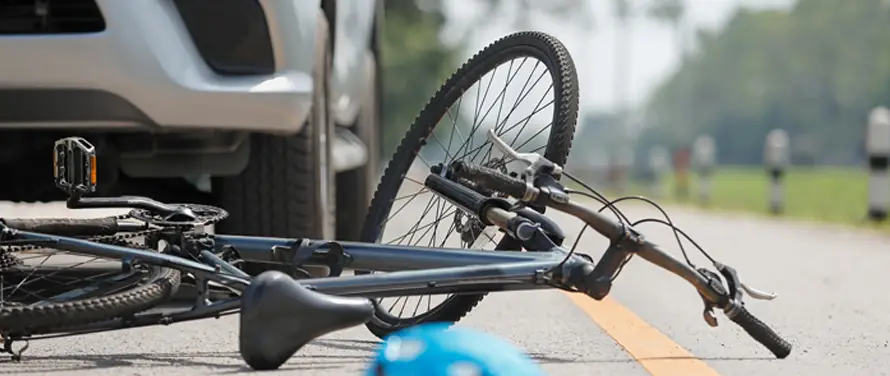
Bicycle Accidents
As people look for healthier and greener options for commuting and exercising, the number of bicyclists on the roads has increased. By almost every measure — including the number of bikes, biking trips, and miles traveled — Americans cycled more in 2020 than ever before.
Unfortunately, more bikes mean more bicycle accidents. In 2019, the most recent year with data, about 850 bicyclists died and 49,000 sustained injuries in traffic accidents in the U.S. This means that bicyclists made up over 2% of traffic deaths.
Here are some facts about bicycle accidents and an overview of the ways that bicyclists can seek compensation for injuries.
How Bicycle Accidents Happen
As part of its role in reducing auto accidents, the National Highway Traffic Safety Administration (NHTSA) collects detailed data about bicycle accidents.
Common Times for a Motor Vehicle Accident Involving a Bicycle
According to the NHTSA, the most common time of day for an auto accident involving a bicycle is dusk. This makes sense because the early evening hours have higher traffic levels than late evening and night hours. Also, motorists can have difficulty spotting bicyclists as the sun sets.
As a result, one of the most important pieces of equipment for reducing the risk of a bicycle-related traffic injury is a light. Additionally, the NHTSA recommends featuring a full set of reflectors on the bicycle and bike pedals, as well as reflective strips on clothing.
Common Locations for a Bicycle-Related Traffic Accident
Data from the NHTSA shows that 60% of bicycle accidents happen on roads, away from intersections. This implies that most bicycle accidents happen when cars pass bicycles.
This does not necessarily explain who caused the bicycle accident because the NHTSA’s data combines accidents caused by:
- Lost control of a vehicle
- Lost control of a bicycle
- Mechanical problems with either the vehicle or bicycle
- Surface conditions affecting either the vehicle or bicycle
The next most common sites for bicycle accidents are intersections. Bicycle accidents at intersections occur most commonly when a car:
- Overtakes a bicycle while approaching an intersection
- Makes a right turn into a bicycle traveling with traffic
- Makes a left turn across traffic into a bicycle
In addition to the locations in which bicycle accidents occur, the NHTSA also collects information on the environment for bicycle accidents. Nearly four times as many bicycle accidents happen in urban environments as rural environments. This difference likely arises due to higher vehicle traffic in urban areas.
Common Bicycle Accident Injuries
A collision between a vehicle and a bicycle results in a massive transfer of energy to the bicycle and bicyclist. A collision that causes severe cyclist injuries might not cause any auto injury to the driver or passengers in the vehicle.
Some common injuries seen in bicycle accidents include:
Road Rash
Road rash is a severe abrasion of the skin. In some cases, road debris can become embedded in the skin, causing a tattoo-like discoloration.
Dislocations, Strains, and Fractures
During a bicycle accident, the cyclist will often hit the vehicle, then hit the pavement. In either of these collisions, the cyclist can fracture bones, strain muscles, and dislocate joints. These injuries can cause severe pain and result in permanent disability.
Head Trauma
No state requires adult bicyclists to wear a helmet. The District of Columbia and 21 states require helmets for juvenile cyclists, with the cutoff age ranging from 12 to 18.
Because of the lack of universal helmet use, head trauma can occur in a bicycle accident. These head injuries can range in severity from a minor contusion to a fatal brain injury.
Facial Trauma
Facial trauma can occur when a vehicle collides with a cyclist. Common facial injuries include:
- Broken noses
- Fractured cheekbones
- Dental fractures
- Debris in the eyes
These injuries can result in scarring and permanent disfigurement.
Back and Chest Injuries
A bicycle accident can result in broken vertebrae and ribs. These types of fractures can lead to life-threatening injuries such as:
- Severed spinal cords
- Punctured lungs
- Cardiac tamponade
- Internal bleeding
The consequences of internal injuries can include paralysis and death.
Seeking Compensation for a Bicycle Traffic Injury
Auto insurance policies cover injuries to cyclists and pedestrians. After a bicycle accident, you and your accident attorney will file a claim with the at-fault driver’s insurer.
To receive compensation, you will need to show that the driver acted negligently in colliding with your bicycle. You can prove negligence by showing that the driver failed to drive in a reasonably prudent manner.
The insurer may try to shift blame to you by asserting that you also behaved negligently in causing the crash. Complicated fact issues might prevent your lawyer from settling your case and you might need a jury to assign fault for the accident.
If you succeed in settling or winning your case, your damages include compensation for medical expenses, lost income, and pain and suffering.
To learn more about the ways that you can claim compensation after a bicycle accident, complete our online consultation form or give us a call. We’ll help to match you with a skilled local lawyer.
Free Accident Claim Review
Complete the form to request an attorney review of your accident claimCOMPLETE THE FORM TO BE CONNECTED WITH AN ACCIDENT ATTORNEY
No Matching Partners at the Moment
Thank you for your inquiry but there are no matches for you at this time. Please come back later and try again.
Attorney Advertising. TrafficAccidents.com is a legal marketing website that connects consumers with independent attorneys. The information on this site is for general informational purposes only and is not legal advice. Submitting information does not create an attorney-client relationship. Results are not guaranteed and vary based on the facts of each case.


